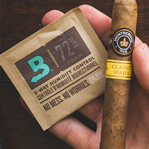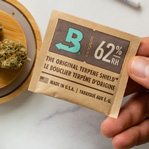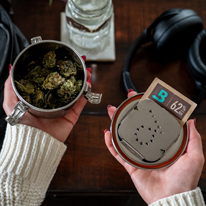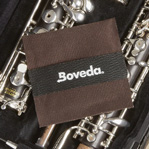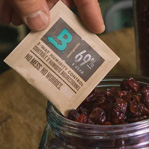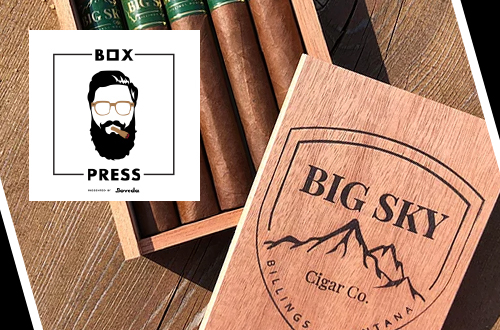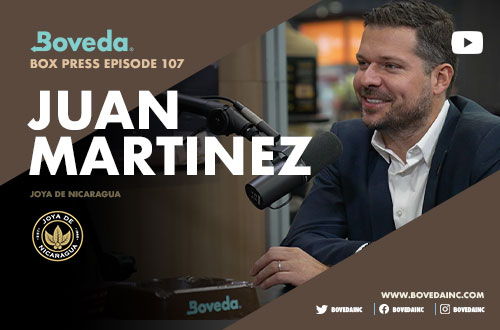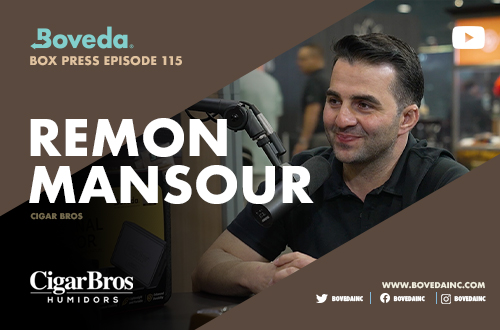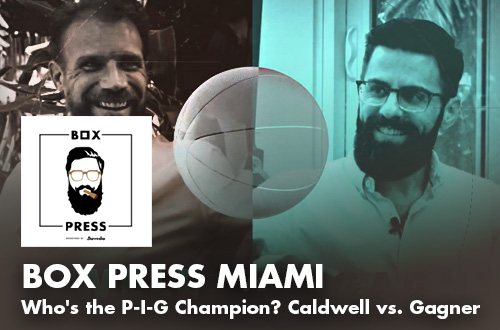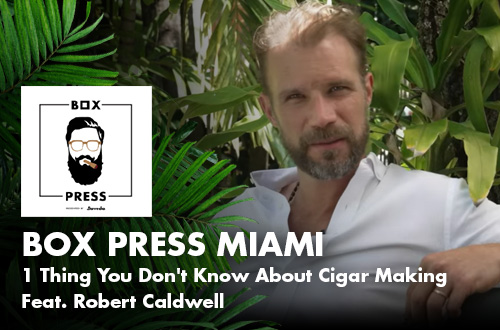Did you know that cigars—a lot of cigars—were once made in the U.S.? Learn your U.S. history of cigars in America’s West in this Box Press episode with Big Sky Cigar Company and Boveda’s Rob Gagner at 2021 Tobacco Plus Expo in Las Vegas.
Jess Coleman and Brandon Marsh rejuvenated the Montana boutique cigar scene building on the state’s rich tobacco heritage. Did you know that in the early 1900s, Montana was home to over 107 cigar factories? Today’s Big Sky Cigars are designed locally and contain only the highest quality Nicaraguan tobaccos.
Brandon sold his prized 1969 Camaro to launch Big Sky Cigar Company. Hear how this boutique brand got its big break through Luxury Cigar Club and a tackle box of hand-tied flies and hand-rolled cigars featured in Fly Fishermen’s Magazine’s gift guide. If you love A River Runs Through It, check out Big Sky Cigar Company.
Big Sky Cigar protects the cigars it ships to smokers with Boveda to preserve the sugars and oils of their tobacco blends. You can protect your cigars just like cigars makers, too. Shop Boveda for cigars here.
Read Full Interview: Video Transcript
If you’re a smoker who wants to try new cigars, pay attention to what’s happening in the boutique space. Experience the different flavor profiles of the tobacco blends, as well as the origin stories of artisanal cigar makers, like Big Sky.
– [Rob Gagner] There’s a story inside every smoke shop, with every cigar, and with every person. Come be a part of the cigar lifestyle of Boveda. This is Box Press. Welcome to another episode of Box Press. I’m your host, Rob Gagner with Boveda. And I’m at TPE, on our second day, and I’m sitting down with a very important company hailing from the Big Sky State, Montana. This is Big Sky Cigar Company. Now, most people think of cigars hailing from the Caribbean, somewhere in the south, Caribbean tropics area, getting rolled by somebody from the Dominican or Nicaragua. But most people don’t understand that a majority of the cigars rolled in the early 1900s were actually coming out of the United States. In fact, to put it in perspective, New York City produced more cigars than Cuba by 10 times. And we’re sitting down with Big Sky founders Jess Coleman and Brandon Marsh to talk about how they got their company started. Thank you guys for joining me.
– Yeah, thanks for having us, Rob.
– Yeah. I love your cigar line. The first one I had was the one with the blue mountaintop.
Cigar Gift for a Fly Fisherman
– [Jess] Yeah, the Bighorn.
– The Bighorn, great cigar. And today, we’re actually smoking the Bitterroot which is—
– [Jess]Yeah, so we just released this stick yesterday as part of our TPE presence. So the Bitterroot Valley and the Bitterroot River, it’s in Western Montana. By foot, if you were to go through the mountains, it’s about 40 miles or so by trail to the Idaho border. By road, it’s probably about an hour’s drive. So the Bitterroot River, a famous fly fishing river, it starts out as the east and the west fork and then flows down towards Missoula, Montana, which was really kind of the setting for the movie A River Runs Through It. I don’t know if you’re familiar with that.
– [Rob] Oh, yeah.
– [Rob] Yes.
– So a big part of our influence and our upbringing in Montana and being in the fly fishing scene, so.
– Because you even have a cigar sampler pack that has hand-tied fly knots or flies in it.
– That’s correct. Yeah, so that’s our Montana River Box. And we were tossing around when we started the company what we could do to be unique and represent who we are. And we threw around the golf piece, but that’s overplayed, right? And didn’t really connect with what we’re looking to do. And Brandon came up with the idea of the River Box. So that comes with five cigars in a proper cigar box, and then there’s Spanish cedar inlays. And you get 12 hand-tied flies that are tied in Columbia Falls, Montana, and then a guillotine cigar cutter. So we’ve worked with Fly Fishermen Magazine. We’re in their Father’s Day gift guide right now as we speak with that.
– [Rob] Nice.
– It’s been a real success for us so far, so.
– [Rob] It’s a beautiful presentation.
– [Jess] Thank you.
Launching Montana’s Boutique Cigar Brand
– [Rob] How did you guys, take me back to the time where you’re thinking, “Let’s start a cigar company.” What spawned that conversation, especially between the two of you? How did you even come to meet each other and decide we’re gonna go into business together?
– Yeah.
– [Brandon] Jess and I have been friends now for I’d say 13 years, and we’ve been throwing ideas back and forth of what businesses to start, and just throwing darts at the wall, seeing what sticks. The first thing we got into were cattle. We have a herd up in Northeastern Montana. We run shares on my family’s ranch, so that’s pretty cool. And then one day, Jess is out fishing and he calls me up, he’s like, “Dude, I got an idea!” I was like, “What?” And he was like, “Why doesn’t Montana have its own cigar company?” And we didn’t know at the time that there was already Cattle Baron out of Dillon. There’s the Montana Sports Cigar out of Livingston. But we just wanted to do it a little bigger. And so Jess went through all the pink tape for about six months and—
– [Jess] Yeah, so like he said, we developed all these ideas for years. We had worked together in the energy industry, and we both have business degrees from schools in Montana.
– [Rob] Is that how you met each other is you worked together?
– Yeah, in the energy, I used to work for his dad, and then he was in college. And then he came out and he was working on my crew. So it was my entire goal to get him to quit every day, so not by being mean, but by holding him accountable.
– [Rob] Yeah!
– [Brandon] Yeah, whatever.
– [Rob] But you had known him through family and friends before—
– [Jess] No.
– [Rob] Before college?
– [Jess] I only knew him through the connection through his dad a little bit, but not on any, not on like a friendship level.
– [Rob] So since you knew his dad, you’re like, “Let’s break his son a little bit “and get him working hard.”
– [Jess] Exactly. And his dad was in full support of that. And still is.
– [Rob] Yeah, yeah, and he still is
– Yeah.
– In fact, he still calls me every day to tell me, “Has my son left the job site yet?”
– [Jess] So we developed this idea. All the ideas that we had before, I mean, from inventions, business ideas, so on and so forth, we came up with it, got all excited, called each other, and then you’d go on Google and get crushed that all this has already been invented, someone’s already doing this.
– [Rob] So you guys aren’t doing a very good job of researching your ideas before you actually like spend all the brainstorming time.
– [Jess] Yeah, they get excited and get crushed.
– Yeah, right.
Why isn’t there a Montana cigar?
– [Jess] So that literally happened, I mean probably a hundred times, right? And then so the cigar thing comes up, same thing, called him all excited, “Hey, we should do this. “Why isn’t there a Montana cigar?” And then we look it up, and again, there’s two, right?
– [Rob] A couple.
– [Jess] But we said we can do this differently, right? And that’s, at the same time that we discovered there was two is when we discovered the history of cigars in Montana. So we felt that, again, like you were saying, trying to establish this disconnect from the Caribbean, this is a story that we can stick to. This is something that we can build on, bring the legacy back to Montana, bring the story back.
The History of Cigars in America’s West
– [Rob] Yeah, because it has roots, it has historical facts. I mean, I’m looking at some of these numbers that were in the Billings Gazette. In 1905, Montana had over 107 cigar factories within the state. With only over, with a little over only 240,000 people in the entire territory, that equals one cigar factory for every 2,200 people.
– [Jess] Yeah, incredible.
– One cigar factory for every 2,000, a little over 2,000 people?
– [Jess] Yeah.
– That’s insane. Was it just because it was like a transient town, because of the railroad being built, and I’m sure gold mining and forging west?
– Yeah. So the research that we’ve done and kind of our stance is that there was a lot of migrant labor that came in for, like you said, railroad and mining. Copper mining is massive in Montana. That’s really what put it on the map.
– [Rob] Sure.
– There’s several mansions throughout Butte, Montana, and over in Hamilton that are known as the Copper King Mansions, right? Butte, Montana is called the richest hill on Earth for its copper deposits.
– [Rob] Really?
– Yeah. And so our thought is, and from what we’ve read is that all this migrant labor came in and the build out of the railroad and then in support of the mines, right? And then as that ebbed and flowed, people peeled off and started businesses and support retail businesses and otherwise. And a lot of these folks had the heritage being migrant type labor, and had the heritage and the know-how and the connections to get the tobacco, and then they started rolling on a small scale to support the other folks in the industries around them. And then it really grew in support of places outside of Montana where we found boxes of cigars in Montana antique stores that we’ve gone around as part of our market research to find old labels and such. And a lot of them were produced in Montana and immediately exported to New York, so it was in support of the New York production, right?
– [Rob] That huge production inside New York.
– Yeah, and so the—
– [Rob] There’s a lot of people that wanted those cigars.
– Absolutely. And then in Livingston, Montana, so Livingston is just outside of Yellowstone National Park and it’s like kind of a gateway town, a really beautiful town. And so at one point, the Garnier Cigar Company was—
– [Rob] Garnier?
– Garnier.
– [Rob] It’s like my last name. Are you sure?
– Yeah. You may have a connection, so.
– [Rob] I got roots in the cigar business. No, I’m just kidding.
– So at one point, they were producing 40,000 sticks a month out of Livingston, Montana.
– [Rob] Wow.
– And that made them the second largest employer in Montana at the time, so this was early 1900s. And so they were only second to Burlington Northern Railroad. So it’s just incredible.
When Was the Golden Age of Cigars in the U.S.?
– That’s what I read. It’s unbelievable. So just to put it in perspective though, the golden age of cigars. We had kind of like the golden cigar boom in the late 90s. This isn’t a cigar, it’s not a cigar boom. It’s like the golden age. And just to set the perspective, that golden age means you would have found cigars in every store a man was likely to walk or a woman was likely to walk into. So we’re talking hotels, restaurants. They said the only places you wouldn’t have found them are in doctor’s offices and I think the post office, like a federal facility or something like that. But it was amazing to think that cigars were everywhere present, the drug store, the hotel, the restaurant, the convenience store, everything.
– [Jess] Yeah.
– [Rob] So you could pick up a cigar anywhere.
– Yeah. Yeah, one thing we found, again, doing research at the antique stores, we went, we traveled the state and hit, I don’t know, a hundred and some antique stores9;48 when we were trying to figure out our branding because we were looking at maybe contacting a family that was connected to one of these brands and paying them a royalty, or buying the original artwork and bringing back some of the original branding from that time. So one thing that we found was cigar tokens, and there are plentiful. I mean, we’re still finding them in antique stores. So you’d have a cigar token that was linked to a certain brick-and-mortar, not brick-and-mortar as we know today in the cigar business, but like you’re saying, convenience type stores, hardware stores, and then this was good for one cigar.
– So it was like almost like a gift card, but it was a good way to get somebody to come back to your store.
– [Jess] Yeah, it’s like a drink token at a bar today, yeah.
– The other thing that I thought was interesting, so a directory from 1893 lists 26 factories in Montana, and a factory of a decent size was about 10 employees was a good size factory, and that kind of borderline between small and medium. And the cigar manufacturers could set up a shop for $3, three whole American dollars to set up your cigar factory. And more importantly, they could get a credit from the tobacco company or supplier. So somebody’s paying you, kind of, in a way, as a credit three bucks to set up a shop so they can sell more tobacco through your chain.
– [Jess] Yeah.
– That’s brilliant.
– [Jess] Yeah, it is. Yeah, I think that would be illegal today, probably. Yeah, but, like, hey, if I help you build it, they’re gonna come and buy, and now I can sell you more tobacco.
– [Jess] Yeah, yeah, an excellent way to expand your footprint.
– Yeah, that’s marketing 101.
– [Jess] Absolutely, yeah.
– Supply and demand. More demand needs more supply. Love it. Great stories. And then too, back then, like cigars were 15 cents, and I love the little catch, two for 30 cents or two for 25 cents, like it was like, “Hey, I’ll give you a 5-cent discount if you buy a couple.” So it was like, yeah, I would, if I were wealthy, I’d definitely walk in and buy two. Why not? One for the road and one for now.
The Guy Who Sells Cigars Near Yellowstone National Park
– Yeah, so that Garnier Cigar Company, their main cigar that they produced was called the Montana Sport, and the band on it is a springer spaniel. And so there’s a gentleman in Livingston that brought that company back. And he just did it more as a hobby. He doesn’t have any distribution. He actually sells ’em on the side of the road on the way to Yellowstone National Park. But you go in and visit with him and he has a ton of the original marketing materials and branding and boxes. And so he has their cardboard Montana Sport boxes, but they’re all listed 5 cents, 5 cents.
– [Rob] That’s awesome.
– Yeah, it’s incredible.
– So cool. So now, you guys decide to start a cigar company, kind of like, do you even know how to do this? Are you kind of like floundering? Like, what do I need to do next?
– [Jess] Yeah, so we agreed to do it. And we smoked cigars before we started the company, but I wouldn’t say that we were, we certainly weren’t in the business in any way, shape or form. We weren’t connoisseurs, right? We’re still continuing to learn. I think we all are, right?
– [Rob] Oh, absolutely.
Travel to Miami’s Little Haven to Learn More About Cigars
– As far as the business goes and the art behind it. So the first move that we made, Brandon was working on the road and wasn’t available to make a trip, but I flew to Little Havana and just figured that was a good place to start.
– [Rob] Yeah, down in Miami. That’s a great spot to go and figure out how do I get a cigar rolled for me.
– Absolutely. So I just spent a week there smoking until I was sick, basically, walking around and talking to people and just learning, watching. I went to El Titan de Bronze, watched them roll. First time I’d ever seen a cigar rolled, right? First time I had seen a draw machine, a draw testing machine.
– [Rob] So you decided to start a cigar company without ever seeing a cigar rolled?
– That’s right, yeah.
– [Rob] How gutsy is that?
– Yeah. I think we were just, one thing for me, just speaking for myself, is in the business ideas that I had coming up and going through business school, like I was, I’ve always wanted to produce a product that I could sit with someone and watch them consume and get their reaction, whether that be food, alcohol, and a cigar, right?
– So you’re smoking one of our cigars right now.
– [Rob] Right.
– This show, we get to spend time and get feedback from people. And now, with our growing presence, we get feedback. And to me, that’s the dream, right? And I thought that this would be a good marriage of that in terms of we can go out and develop a cigar with someone or several different people, right, and make it our own, and have control of the artwork and how we build the brand. And so, yeah, it all started out in Little Havana. So it was a week there.
Feedback from Cigar Smokers Influence Big Sky Cigars
– But wait a minute. Before we go on to Little Havana, why is it more rewarding to see and build something that people consume and you get to see their reaction versus like some people build online things that are pass-through income? Why is it more rewarding for you?
– So I think, well, I know the big thing for me is, it’s the same as if I was a craft brewer of beer or a craft distiller, that I can sit there, engage with somebody, understand what they like and don’t like about the brand, that we can take feedback and make changes and get it right. I liken it to, in my mind, the worst career I could ever have is be a radio host, right? So I’m in a room–
– Hey, hang on, hang on.
– [Jess] I’m sorry.
– We’re getting real close to my territory.
– I know. But you’re sitting in a room all day, you’re sharing your heart and soul with somebody, but you’re not seeing the interaction, and you’re not seeing the feedback.
– So you like to see the interaction, because those radio hosts probably know they impact people because when they go out into the public, people come up to them almost like celebrities and say, “I listen to you every day.” They are very connected to other people’s lives. But you like the feedback, immediate feedback from somebody.
– Exactly, yeah. And just not so much for myself but just to build the relationship and learn about somebody else, be able to make changes, be able to let somebody know that they’ve had an impact on the direction that our company is going, right? So one thing that we’ve done recently is our second cigar that we released was the Bighorn. It was made at Tobacco Costa. We recently just rebuilt that cigar, just released the Bighorn 2.0, and we did that based off of feedback from our customers.
– [Rob] Really?
supporting local economy
– And it was a massive expense for us, a massive undertaking to do it, but I think for us to be able to pivot and have the ability to make those changes with the size of our company I think is excellent. I think it helps us solidify the bond with our customers and make them feel part of what we’re doing too. I guess the last point on this is just being able to have something that’s local in terms of, we aren’t making our cigars in Montana, right? We’re making them in Nicaragua, but we go there every time we develop a cigar.
– [Rob] Right.
– We’re involved in every step of the way. On the Montana side of it, we’re supporting all of our printing, all of our, every bit of work that we can do, our graphic work, we’re doing that in Montana, trying to bring money back to the state.
– [Rob] Right.
– And then we’re paying, of course, 50% cigar tax in Montana, which is just pretty rough, but it supports the local economy, so.
– I’m actually surprised your state, with how much history they have in premium cigars and all this rolling and all this history that they have, such high tobacco tax.
– Yeah. It’s tough. I mean, we own a brick-and-mortar separate of Big Sky, something we did afterwards. It’s hard to compete with online, right? If you have a 50% tax and someone can go buy the stick online and not have to incur the tax, it makes it tough, and that makes those relationships all that more important and the service, right?
– [Rob] Right.
– So—
– Absolutely. So you get the idea, obviously, to start your company from the roots that are already laid in Montana, the history through it all. But I gotta assume, especially in the beginning, there have got to be some areas where you were like, “You know what? “The juice just isn’t worth the squeeze. “I think this project was a passion project “and we got to put it to bed.” What happened there?
– I don’t know if I’ve felt that as far as it’s not worth the squeeze. I’ve always been passionate about this, and we enjoy smoking cigars with our friends and meeting people in the cigar community. I mean, that’s been a great experience and rewarding but—
– [Jess] I’ve secretly felt it.
– [Rob] Yeah?
– Yeah.
– [Rob] It kinda felt like, “Hey, this is a little too much.”
– Yeah, so we, I mean, one thing we, I’ll just tell you. So we launched, we did as much buildup as we could within our means before the launch of our first cigar, the Yellowstone. And we came up with this band design that I thought was amazing at the time. And I look back on it now and I was like, “This wasn’t that great.” But so we, we put all this stuff together and we built the website, went through a bunch of struggle to get that done and get all the legalities stuff handled. And we posted on Instagram, posted on Facebook, tried to drive as much following as we could in anticipation for the release of the cigar. And we posted it. We launched the website. Boom, we’re live, Instagram, Facebook, let’s do this, and nothing, right?
– [Rob] Crickets.
– Nothing. And it’s kind of that point where you believe so much in what you’re doing, and you have the passion, and you think it’s a great idea, and it was the first moment that it hit me in the face, like, maybe this isn’t a great idea, right? Maybe this hurdle of people not thinking that Montana has any connection to the cigar world cannot be overcome. And that’s a battle we continue to fight today as we try to grow our brick-and-mortar footprint, is people, well, they just don’t associate Montana at all with cigars, which is great while we’re talking about this history. But there’s been several times where I’ve been just to the point where we’ve thrown money, thrown money and tried to build this thing. I’ve been to the point where I’ve almost made a few phone calls to you. But we’ve just kept pushing through, and it seems like that we’ve had the good fortune at the right times—
– [Rob] Sure.
– With manufacturers and with just the general public and people finding support and a connection with our story, whether it be the outdoor side of what we do, right, or the charitable element of what we do, or just the idea of something different outside of what they’re used to.
– When did it flip a switch where you stopped hearing crickets and you were like, “Okay, this is,” do you think you knew what happened? How did people start to hear about your brand?
– So one of the big things for us was, so we did, we went through kind of a rebranding after our first launch. We had that, our bands, we had our boxes set up a certain way, and Brandon made a connection with a new graphic designer. We went, I kinda went back to the drawing board based on feedback from customers and cigar shops, and we went back to the design board, the drawing board on our banding, right?
– [Rob] Sure.
– And so he made a connection. We ended up with the top band on our cigars that you see today with the mountains and—
– [Rob] Yeah, gorgeous.
Big Sky Cigar Company’s Big Break in Luxury Cigar Club
– And that was kind of the first step where people were like, “Whoa.” And we went back to some of the people that were a little bit negative or gave us maybe some criticism about our bands and they said, “This is workable.” The second thing was on our first cigar, we were able to get into Luxury Cigar Club.
– [Rob] Yeah.
– And that was our first step out into the national market.
– [Rob] That’s how I discovered your brand.
– Yeah, and so that is, those guys have been really good to us. We’ve been in their box three times now. And the one thing, what they’re trying to do is bring a product and add value to people that may have not had certain cigars or can’t get them locally, right?
– [Rob] Right.
– And we certainly fit that bill. And so it’s been a great relationship. And from our first placement in their box, it’s really been, it’s been uphill since then, so in terms of growth.
– So you think the subscription service really helped get your brand some really good exposure.
– [Jess] Absolutely.
– That’s awesome to hear, man. I like hearing that because you never know sometimes if it’s worthwhile, but exposure is the number one thing, right? They gotta be able to smoke your cigar in order to be attached to it.
– [Jess] Absolutely.
– So that’s great. What types of sacrifices have you made in order to keep your cigar company going?
– [Brandon] Well, like I worked on the road in the energy industry, so it’s like six, seven days a week. So it’s Big Sky Cigars, what I can do during the day and then at night. And so kind of, it’s put a little strain on our friendship, I’d say, a little bit, because I haven’t been able to be there and put, have my feet on the ground, but I do as much as I can. But I mean, we’re working through it, so that’s kinda cool.
– [Rob] Yeah.
– I think for me is then, so I also worked full-time in energy as well. And I have, I’ve had to work, balance that, having a family. I have two kids, three or four and seven, a son and a daughter.
– [Rob] Wow, cool.
Sold a 1969 Camaro to Back Big Sky Cigar Company
– And I think balancing, doing my normal job, making sure I keep that whole, and then keeping my family life positive, and going through the growth of my children. Now they’re in tee-ball and so on. And then making sure that we get it right with Big Sky. And so we’re in that phase where we can’t afford to make any mistakes, and like we have to make the right decision at all times. We’ve got to make sure that our customers are taken care of at all times. We’re not in a situation where our cigars are just shipped from Florida to these, to our consumers or to these brick-and-mortar shops. We’re doing all the fulfillment. We’re doing all the supply chain management. We’re doing all the marketing. We’re doing all of it. And we’re doing it all out of our pocket. We’re not under any venture capital. We’re not operating off of any loans. It’s something that him and I have bankrolled in its entirety. And Brandon actually sold his childhood dream car to buy into the business, a ’69 Camaro.
– ’69 Camaro.
– Yeah.
– How hard was it to let that go?
– I mean, I had it for six years and I love that car. I wanna buy it back if I can one day, but who knows if that guy will sell it to me.
– Why did you guys, you had to sell it because you needed the cash.
– Well, just to, for–
– Get it off the ground.
– The initial capital investment, for the bands and the boxes.
– It’s smart though because you don’t want to take a loan. You don’t want other investors telling you what to do, I bet, either.
– Yeah, we don’t wanna be beholden to anyone. Down the road, if we grow the brand, continue to grow the brand, which I think we will, something we may consider and maybe something we have to do at some point to really cement our foothold nationally. But at this point, we continue to bootstrap everything we do. It’s, as my dad calls it, sweat equity.
– Yeah. What do you think is really important for you to do, especially for retailers and consumers to let them know that you’re not gonna just be a flash in the pan, that you’re gonna be around for the long haul? What do you think is the most important thing for you to be doing right now?
– So for me, it’s service and listening. So we tell everyone that we meet that we’re not cigar aficionados. We’re learning every step of the way. We’re passionate about the products that we develop. We go, excuse me, we go to Esteli twice a year. Everything we develop, we’re putting our hands on, and really just staying in touch with the customer and understanding that we’re at their mercy, right? We’re building products for them. We’re not building products for ourselves. And just to continue to grow that story, allow people to have a connection with what we do.
– How are people connecting with you right now so you can get their feedback?
– So we have a website, www.bigskycigar.com. We also have an Instagram and Facebook presence. Brandon’s phone number is on the website. He takes all the calls.
– [Rob] Oh, Brandon. Sorry, brother.
– Yeah. I’d say through Instagram and being part of different cigar groups. Like I’m part of the Barrel Burners.
– [Rob] They’re letting you know what they think of your brand.
– And it’s great feedback. We wanna make them happy.
– [Rob] How do you know what is good feedback and what is bad feedback?
– Good versus bad feedback? I guess if constructive criticism, if they’re trying to tell us like what we could do to make it better, I mean, that’s great feedback because we wanna have the best cigar out there that we can produce.
– [Rob] Right.
– So—
– And I think it’s all good feedback. I think if someone’s giving us feedback, they’ve taken the chance and interacted with our brand.
– [Rob] Right.
– So I look at it all as positive. We have an opportunity in every bit of feedback. Every interaction we have is an opportunity, so.
– [Rob] So you don’t think it could lead you astray, like too much customer feedback might lead you off your kind of true north, your path?
– No, I think we’re certainly not reacting on every certain item of feedback. There’s no way we can.
– [Rob] You’re vetting it out.
– We’re vetting it out. We’re talking to people. One thing is we’ve built great relationships with the two factories that we work with. We have a huge amount of respect for the knowledge and the artistry that comes out of those factories. And the reality of it is they’ve been in the business, right? There’s guys in this room that have been in the business 40, 50 years. And if we’re not listening to those guys and leveraging their knowledge, we’re not gonna be successful, so.
– Smart. I like it. So if I’m gonna have one of your cigars for the very first time, which one would you hand me and why?
– So we, the first cigar we released was the Yellowstone. We were new to cigar smoking, relatively. And so it’s a milder cigar. We think it’s really approachable. You can smoke it at any time of the day. A lot of people of our, a lot of our customers smoke it in the morning with coffee. It’s a river that’s important to us, important to Montana. It means a lot to us, right? And that was really where it all began. Everything that we’re doing now is revolving around that cigar. And that was, that cigar is what allowed us to get our foothold in brick- and0mortar and throughout the U.S. now. We’ve sold that cigar in every state. We’ve sold that cigar, there’s a guy in France that buys it every three weeks and pays more for shipping to France than he does for the cigars themselves.
– [Rob] Wow.
– So it’s really like, kinda like your first love, right?
– [Rob] Big Sky’s international.
– Yeah, exactly.
– [Rob] That’s awesome.
– Yeah.
– Now, I had, what is the blue one again?
Why a Dark Wrapper Doesn’t Mean it’s a Strong Cigar
– [Jess] The Bighorn.
– The Bighorn. I had that through Luxury Cigar Club.
– [Jess] Okay.
– Phenomenal stick. It was super dark. That’s a super dark wrapper.
– [Jess] Yeah, it is.
– And it was intimidating to light up because I was like, I’m not sure what I’m gonna get myself into, but I was on my boat, thought, hey, ultimately, if it’s too strong for me, I can put it down.
– [Jess] Yeah.
– So well balanced. Holy crap, that’s not as strong, for me, it wasn’t as strong of a cigar. What do you guys think?
– Yeah, I would say it’s, maybe mild plus is where I’d drop it.
– [Rob] Yeah.
– A lot of people, so there’s two things with that cigar that people were intimidated with, the dark wrapper, because a lot of people just don’t understand the flavor profiles, right?
– [Rob] The color doesn’t impact the strength.
– Yeah, that’s right.
– [Rob] And strength is measured by nicotine.
– That’s right.
– [Rob] A lot of people don’t think that. That cigar has so much rich flavor and so well balanced, and like you said, a medium plus or a medium. It’s like just phenomenal.
How to Cut a Torpedo Cigar, Like Big Sky Cigar Company’s Bighorn
– Yeah. And then the other thing is being in a torpedo format.
– [Rob] Yes.
– One thing that we value and target is to try to bring new smokers and people that are new to the cigar world, right? And maybe we’re bringing new people into the cigar world. And a torpedo format, if you’ve not smoked and cut a lot of cigars, can be daunting to understand how to cut it ’cause you can certainly cause yourself a problem under cutting or over cutting that.
– What do you recommend? I mean, I always tell people a fourth of an inch off the top, and then two, they need to see where that cap starts. You can see it. You can see the lines of leaf coming up, and that’s kinda your linear guideline. You can’t cut below that. It’s gonna unravel.
– Yeah, and it’s harder like with the torpedo because it doesn’t have as much of the defined cap line, right? So yeah, I think on a torpedo, a quarter inch is a safe bet.
– It doesn’t have like a perfect ring around, but you can, I feel like you can see the coming up of the wrapper a lot easier in a torpedo than you can a normal parejo or rounded cap. So you just tell people to take a small nip off the top. https://www.cigaraficionado.com/article/cigar-shapes-sizes-and-colors-8094
– Yeah, and then just take a dry pull on it and see how it works.
– Yeah, a cold draw to see if it has enough air coming through it. The other thing that I like about a torpedo cap is that when you cut it shallow, shallow enough that it still has a good arch, the shoulder is still arching or it still has that torpedo shape, you’re really getting a lot of that concentration of flavors to come kind of into one smoking experience or one draw. So I feel like it does change the flavor a little bit as far as the intensity of the flavors, and maybe that’s just me thinking, overthinking it.
– Yeah, I don’t know. I mean, it makes sense, right, because it’s bringing everything in. I know that on, like with the select draw cutters, right, or a punch, right, same thing. You’re bringing a lot of the oils right into one place. Some people don’t like that though has been my experience.
– [Rob] Yeah, I don’t like punch cuts because I feel like I get oil buildup and then it tars on me. But with even a straight cut on a torpedo, I don’t get that because it’s still open enough. And I don’t know, I really like it. Good shape, great cigar.
– Thank you.
– [Rob] And I think the more important thing that I learned from that is like color does not indicate strength.
– That’s right.
– [Rob] It’s so important for consumers to not be biased by that.
– Yup.
– [Rob] But it’s hard to get over because it’s natural.
Where to Buy Cigars in Billings, Montana
– Yeah, so we have that brick-and-mortar in Billings, Stogies. And when I can, I go in there and talk to people in the humidor. And I love watching their reactions, right? You can certainly, you can tell someone that knows their way around a humidor versus someone that’s been in there for the first time. They may even be hesitant to walk in the door just because they’re intimidated.
– [Rob] That is so true. That intimidation factor is huge. How do you get customers over that?
– I think, so for me, so my mom runs that store for us. Stogies, Brandon and I own that in partnership outside of this company. We bought it about a year and a half after we started Big Sky. And so we brought my mom in to manage it. We have two employees. And so she’s super easy going. I think it’s about the people that you have in there, right? And I think that—
– [Rob] Yeah, she puts them at ease.
How to Put New Smokers at Ease When They Visit a Tobacco Shop
– She puts them at ease, and I think, and this goes for anything. Like, if I was to walk into a cigar shop and someone was pushing me on something, or took a stance that they were, that they knew everything about it and wanted to talk down to me about cigars or something, I think that sets a poor tone, and I think that you just need to adjust the conversation for who you’re with and make them feel comfortable and make them enjoy the experience. That’s what it’s, the cigar experience doesn’t start when you light it, right? Going in and like looking in that room and seeing everything and having that selection and like the amount of work and art that’s in that room and that variety. There’s so many stories in that room, right? Like the history, all the families, Cuba, the U.S. I mean, there’s so much there. And that should be an experience for someone, not be something that intimidates them, right?
– [Rob] Right, well said.
What Boutique Cigar Brand to Try Now
– And I think that’s how we get people to become part of the cigar world and stay in it, right, and then start following these stories. And the other thing, and this is not selfish in any way, in terms of just trying to get people interested in Big Sky or boutiques, but there are a lot of amazing boutique cigars out there right now, a lot. And I liken it to what has happened in the craft brewing and craft distilling industries where there’s a lot of these big brands out there, excellent stories, excellent cigars, excellent heritage, right? But there’s something happening in the boutique space that people should be paying attention to. And for the folks that only smoke these legacy brands and they won’t move away from it, there’s a lot of opportunity being missed. There’s not, it’s not just for different flavor profiles, but it’s about learning new stories and becoming part of a story like Big Sky, or like Martinez , or like Room101, these guys. There’s a lot of great things happening and a lot of new people being brought into this space, and that’s exciting, right?
– [Rob] Yeah.
Stuck in a Legacy Cigar Brand Rut?
– And I think that if there’s folks out there that are just stuck on one legacy brand, I think it’s time to start stepping out because the quality is there.
– [Rob] Right.
– The same families, the same, they’re being rolled with the same knowledge and history and expertise that these legacy brands are being rolled, and there’s a lot of new and exciting things happening.
– Would you think too the quality of the leaf that you’re buying is of the same caliber as the legacy brands?
– Absolutely, yeah.
– Because you’re paying a premium for it.
– [Jess] Yeah.
– It’s not like it’s like, “Hey, I wanna roll a cigar. And they’re like, “Well, you can play with this tobacco over here, because this is in your price point.” You guys are exposed to all of it, and you can choose whatever you want. They’re gonna name a price and you have to go, “Okay, well, that’s expensive, but yeah. “We’re either gonna take less margin “or we’re gonna charge what we need to charge for it.”
– Yeah, yeah. You don’t have the volume, right? And yeah, that goes for everything we do, right? Printing our bands, making our boxes, we just don’t have the volume. We’re paying for it, but we’re paying for it because like I said earlier, we have to make the right choices. We have to have our quality at the forefront of what we do at all times. And that’s why I push people to try to get involved with boutique brands is because there’s people at this show that are doing this. They’re putting the money out there, they’re putting the effort behind these things, and they’re producing great cigars and great products. And it’s time to start taking a look at these.
Broaden Your Cigar Palate: Spend a Few Dollars Every Month on a Boutique Cigar, like a Big Sky Cigar
– That’s awesome. That’s great. Good advice too on the whole humidor and trying new cigars. I know like for those of you guys out there that have a cigar that you particularly like, keep that in your humidor but take a few dollars every month and go and try to pick something that you’ve never had before. You’ll be surprised. And I think that’s what Jess is saying right now.
– [Jess] Absolutely.
– You guys, I wanna thank you so much for being on Box Press, sharing your story. The heritage of cigars is literally in our backyard. We’ve been making cigars for a long time. And in fact, we’ve outproduced Cuba 10 to one in New York. So guess what. Cigars are so a part of the American culture, it’s not even funny, and this is just a great example of why cigars have an American backbone to them as well, and we can enjoy ’em. And I appreciate you guys bringing this whole, I mean, this box is gorgeous. It just sets the tone, Montana skyline, rivers, trees. I just feel like it just kinda gave me the chills. Like I can feel like I can just go do what I wanna do out in nature, whether it be mountain biking, or fishing, or just being on my boat and enjoy a Big Sky cigar with friends and family. And I just appreciate you guys for doing that.
– Yeah, thanks for having us and–
– Thank you.
– Look forward to working with you in the future. We’ve got, appreciate your products. We include what you guys do in all of our consumer deliveries. It’s an important part, especially in Montana. It’s super dry in Montana and so—
– [Rob] Yeah, we wanna make sure everyone’s got fresh cigars, man.
– Yeah, thank you for having us. Appreciate it.
– You’re very welcome. So for those of you out there that wanna grab some Big Sky cigars, you can go to bigskycigarcompany.com, right?
– Yup, it’s bigskycigar.com.
– Bigskycigar.com, you can get all of your Big Sky Cigars. You can also find them through different avenues like your store in Billings, Montana, which is–
– Stogies.
How to Subscribe to Box Press Cigar Podcast
– Stogies in Billings, Montana. They will ship it to you as well. We appreciate it. Thank you all for watching. If you need anything to keep your cigars fresh, or hey, if you buy a box and you need an extra storage, grab a Boveda Humidor Bag. It’s the easiest way to store more cigars. And as always, bovedainc, follow us on social media. If you liked this interview, give it a like. And if you wanna hear more about companies like Big Sky, subscribe. We’re gonna produce more content like this for you guys. Appreciate you. Have a good week.
This cigar podcast digs into:
- Big Sky Cigar’s Yellowstone River Box, which was featured in Fly Fishermen Magazine’s Father’s Day Gift Guide (2:06)
- Montana’s rich cigar history (5:50)
- Traveling to Miami’s Little Haven to learn more about cigars (13:04)
- Reworking the Bighorn 2.0 based on cigar smokers’ input (15:59)
- Selling a dream car to start a business (24:17)
- Why a dark wrapper doesn’t mean it’s a strong cigar (30:23)
- How to cut a torpedo cigar (30:48)
- Legacy cigars versus boutique cigars and why there’s room for both in your humidor (35:08)
